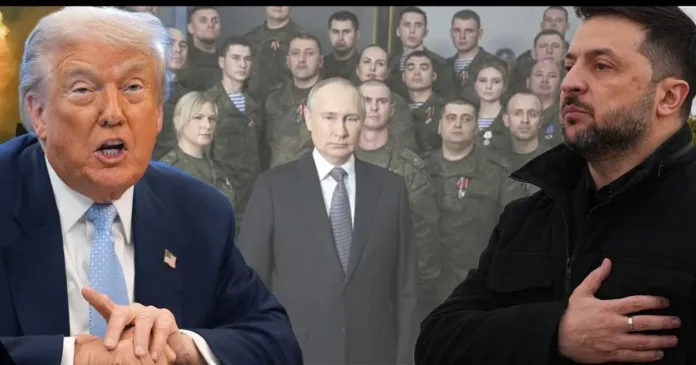Zelensky says he will work on Trump’s 28 point plan even as Europe accuses the proposal of forcing surrender
Ukraine’s president, Volodymyr Zelensky, has agreed to enter negotiations on the basis of Donald Trump’s 28 point plan to end the war, even as European governments loudly criticised the proposal for demanding major concessions from Kyiv. European leaders, led by France, described the package as an attempt to force Ukraine to capitulate to Russia.
The document, released in full on Thursday evening, outlines sweeping terms. It would require Ukraine to cede the Donbas region and Crimea to Russia and to halve the size of its armed forces. The plan would bar Ukraine from invading Russia or using military force to reclaim territory seized by Moscow. NATO troops would not be permitted on Ukrainian soil and foreign combat aircraft could only be stationed in Poland. In exchange, Russia would receive the disputed territory and secure the return of frozen assets, while Moscow would be readmitted to the G7.
Despite the sharp European reaction, a Ukrainian official said Zelensky told a Pentagon official he was willing to work with the Trump administration on the strategy. The official said the president had agreed to work on the plan’s provisions in a way that could bring about a just end to the war and emphasised that Ukraine must secure terms that respect its independence and dignity.
Zelensky reiterated those principles on Telegram, describing his approach as constructive, honest and prompt. He wrote that Ukraine had always sought real peace, one that would not be broken by a third invasion and one that would respect Ukrainian sovereignty. The Ukrainian official added that the president outlined the fundamental principles that matter to the Ukrainian people. Zelensky is expected to hold direct talks with Donald Trump in the coming days to discuss the strategy.
The Kremlin responded by saying any peace plan must eliminate the root causes of the conflict. It also reported that President Vladimir Putin visited the command post of the Russian forces west grouping, where he met Valery Gerasimov, the chief of Russia’s general staff, and other senior officers. General Gerasimov told the president that Russian forces had taken the Ukrainian city of Kupiansk; Ukraine’s military denied the claim. The Kremlin statement has not been independently verified.
White House press secretary Karoline Leavitt described the plan as a good plan for both sides. She said Marco Rubio, acting as secretary of state, and Steve Witkoff, serving as special envoy, had been quietly working on a solution to end the war for the last month.
European capitals reacted strongly. France led criticism of the terms and a number of European ministers said the plan would force Kyiv into unacceptable concessions. Officials in Germany, Spain and Poland warned that sidelining Europe in negotiations that determine Ukraine’s future was unacceptable. Some European leaders argued that restricting Ukraine’s ability to defend itself would only reward aggression.
In Kyiv, senior advisers expressed concern. One adviser described leaked terms of the plan as tantamount to unconditional capitulation, and other officials warned that returning frozen assets to Russia and readmitting Moscow to the G7 would remove key leverage held by Western states.
The speed and secrecy of the plan’s release also drew ire. Several European officials said they learned of the proposal through media reports rather than formal diplomatic channels, a development that heightened tensions between Washington and its European partners.
As reactions multiplied, the core question remained whether negotiations would produce a sustainable peace or compel Ukraine to accept terms many in Europe and Kyiv consider dangerous. Zelensky’s willingness to engage marks a pivotal opening in the diplomatic process. How far Kyiv will move on the plan’s demands, and whether European objections will alter its course, remain open and closely watched.
